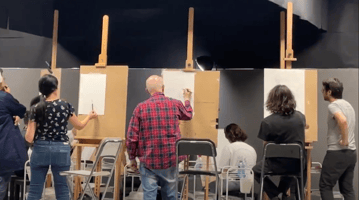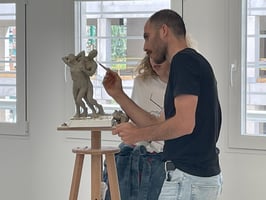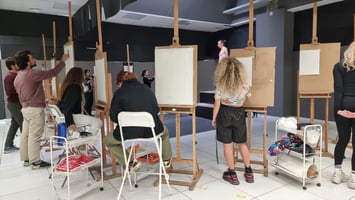Title: Unleashing Your Artistic Potential: The Power of Metalearning in Realistic Art Introduction:...
Making Art Last: 5 Science-Based Techniques for Effective Artistic Learning
Title: Making Art Last: 5 Science-Based Techniques for Effective Artistic Learning
Introduction:
Artistic expression is a beautiful and fulfilling way to explore our creativity, emotions, and thoughts. Whether you're a seasoned artist or just starting your creative journey, the process of learning and improving your skills is a never-ending adventure. But how can we make the most of our artistic learning experiences? In this blog post, we'll dive into five science-based techniques that can help us make our art lessons more effective and long-lasting. So, grab your paintbrush, pen, or camera, and let's get started!
1. Embrace the Power of Practice:
We all know the saying, "Practice makes perfect," and when it comes to art, it couldn't be truer. Scientific research has shown that deliberate practice, which involves setting specific goals, receiving feedback, and focusing on areas that need improvement, can significantly enhance our artistic abilities. So, set aside dedicated time for practice, experiment with different techniques, and challenge yourself to step out of your comfort zone. Remember, progress comes from persistence!
2. Tap into the Science of Memory:
Ever wondered why some artistic techniques seem to slip from your mind while others stick? Understanding how memory works can help us retain and recall artistic knowledge more effectively. Research suggests that incorporating multiple senses, such as sight, touch, and even smell, can enhance our memory retention. So, try using different mediums, engaging in hands-on activities, and associating vivid imagery or emotions with the techniques you're learning. By making your art lessons a multisensory experience, you'll be more likely to remember and apply what you've learned.
3. Seek Constructive Feedback:
Receiving feedback on our artwork can be both nerve-wracking and exhilarating. However, constructive criticism is an invaluable tool for growth. Studies have shown that feedback that is specific, actionable, and presented in a supportive manner can lead to significant improvements in artistic skills. So, don't be afraid to share your work with others, seek advice from more experienced artists, and actively participate in art communities both online and offline. Remember, every critique is an opportunity to learn, refine, and expand your artistic horizons.
4. Embrace Failure as a Stepping Stone:
Making mistakes is an integral part of the learning process, and art is no exception. Researchers have found that adopting a growth mindset, where we view mistakes as opportunities for growth rather than failures, can lead to higher levels of creativity and artistic development. So, don't be discouraged by setbacks or perceived failures. Instead, embrace them as stepping stones on your artistic journey. Learn from your mistakes, adapt your approach, and keep pushing forward. Remember, the true beauty of art often lies in its imperfections.
5. Foster a Sense of Curiosity and Wonder:
Art is not just about technique; it's also about the ability to see the world through a unique lens. Cultivating curiosity and wonder can ignite our creativity and inspire us to explore new artistic possibilities. Engage in activities that stimulate your sense of curiosity, such as visiting art exhibitions, reading about different artistic movements, or experimenting with a variety of artistic styles. By nurturing your curiosity, you'll continuously fuel your artistic growth and keep the flame of inspiration burning bright.
Conclusion:
Artistic learning is a never-ending journey filled with endless possibilities for growth and self-expression. By incorporating these science-based techniques into your artistic practice, you can make the most of your learning experiences and create lasting progress. Remember, art is not just about the final product; it's about the joy of the creative process itself. So, embrace the power of practice, seek feedback, learn from your mistakes, and cultivate curiosity. Let your artistic journey be a vibrant and fulfilling adventure that lasts a lifetime. Happy creating!
Introduction:
Artistic expression is a beautiful and fulfilling way to explore our creativity, emotions, and thoughts. Whether you're a seasoned artist or just starting your creative journey, the process of learning and improving your skills is a never-ending adventure. But how can we make the most of our artistic learning experiences? In this blog post, we'll dive into five science-based techniques that can help us make our art lessons more effective and long-lasting. So, grab your paintbrush, pen, or camera, and let's get started!
1. Embrace the Power of Practice:
We all know the saying, "Practice makes perfect," and when it comes to art, it couldn't be truer. Scientific research has shown that deliberate practice, which involves setting specific goals, receiving feedback, and focusing on areas that need improvement, can significantly enhance our artistic abilities. So, set aside dedicated time for practice, experiment with different techniques, and challenge yourself to step out of your comfort zone. Remember, progress comes from persistence!
2. Tap into the Science of Memory:
Ever wondered why some artistic techniques seem to slip from your mind while others stick? Understanding how memory works can help us retain and recall artistic knowledge more effectively. Research suggests that incorporating multiple senses, such as sight, touch, and even smell, can enhance our memory retention. So, try using different mediums, engaging in hands-on activities, and associating vivid imagery or emotions with the techniques you're learning. By making your art lessons a multisensory experience, you'll be more likely to remember and apply what you've learned.
3. Seek Constructive Feedback:
Receiving feedback on our artwork can be both nerve-wracking and exhilarating. However, constructive criticism is an invaluable tool for growth. Studies have shown that feedback that is specific, actionable, and presented in a supportive manner can lead to significant improvements in artistic skills. So, don't be afraid to share your work with others, seek advice from more experienced artists, and actively participate in art communities both online and offline. Remember, every critique is an opportunity to learn, refine, and expand your artistic horizons.
4. Embrace Failure as a Stepping Stone:
Making mistakes is an integral part of the learning process, and art is no exception. Researchers have found that adopting a growth mindset, where we view mistakes as opportunities for growth rather than failures, can lead to higher levels of creativity and artistic development. So, don't be discouraged by setbacks or perceived failures. Instead, embrace them as stepping stones on your artistic journey. Learn from your mistakes, adapt your approach, and keep pushing forward. Remember, the true beauty of art often lies in its imperfections.
5. Foster a Sense of Curiosity and Wonder:
Art is not just about technique; it's also about the ability to see the world through a unique lens. Cultivating curiosity and wonder can ignite our creativity and inspire us to explore new artistic possibilities. Engage in activities that stimulate your sense of curiosity, such as visiting art exhibitions, reading about different artistic movements, or experimenting with a variety of artistic styles. By nurturing your curiosity, you'll continuously fuel your artistic growth and keep the flame of inspiration burning bright.
Conclusion:
Artistic learning is a never-ending journey filled with endless possibilities for growth and self-expression. By incorporating these science-based techniques into your artistic practice, you can make the most of your learning experiences and create lasting progress. Remember, art is not just about the final product; it's about the joy of the creative process itself. So, embrace the power of practice, seek feedback, learn from your mistakes, and cultivate curiosity. Let your artistic journey be a vibrant and fulfilling adventure that lasts a lifetime. Happy creating!
Curiosity,
self-expression,
mistakes,
persistence,
artistic journey,
comfort zone,
receiving feedback,
artistic abilities,
artistic horizons,
artistic movements,
artistic styles,
artistic practice,
creative process,
cultivate curiosity,
Artistic Learning,
Constructive Feedback,
growth mindset,
creativity,
artistic growth,
growth



